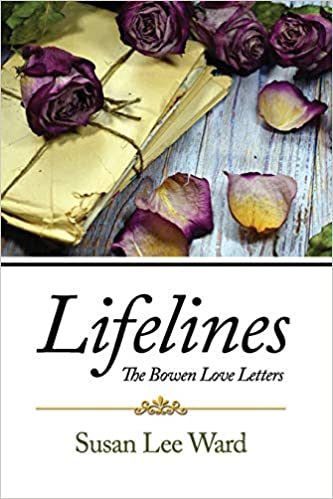“For it was not into my ear you whispered, but into my heart. It was not my lips you kissed, but my soul.” Jane Eyre by Charlotte Brontë
Love letters are not just about “How do I love thee?” (Sonnet 43) as written by Elizabeth Barrett Browning. They are expressions of affection between people who care about the well-being of other people. Love letters are certainly written by passionate lovers, but they can also be written by relatives and close friends as a way to stay in touch.
I think of love letters in a broad sense. They can be cards, messages on sticky notes, refrigerator magnets, and emojis. In Lifelines – The Bowen Love Letters, the surviving letters were more formal and expressed not only reassurances of deepest affection, but also hopes for a bright future. These letters transcend time and space.
In Lifelines, we primarily hear the voices of Katie and Isaac Bowen, our protagonists. Their letters and journal entries allow them to speak to us from great distances, and let their perspectives be heard and felt by readers over 160 years later.
Lifelines begins on January 1, 1846, when Katie and Isaac wrote to each other every Sabbath under the same moon. They called it their “spirit communion.” They numbered their letters during the three years of Isaac’s deployment in Mexico to make sure that all were received. But not all were. Some were lost at sea and some were “absquatulated” by the Mexican Army.
“I only wonder that they come at all, so great is the distance.” Katie Bowen, July 12, 1846
Sample Love Letters from Lifelines – The Bowen Love Letters
July 4, 1846 – Camp near Fort Brown, Texas
My dear wife,
One year ago how delightfully we spent this day together, not as the year before, the gay and wild young man admiring the pretty and agreeable girl, but the devoted husband loving and admiring the wife of his bosom. Today the scene is again changed and I am alone, far from thee, my beloved wife, far from the scenes of so much pleasure, happiness and contentment, and instead of the peace and quiet enjoyment that was then ours, and the country’s, surrounded by thousands who are thirsting for battles, conquest, and slaughter, and impatiently awaiting orders to move to such scenes. Shall not another Fourth of July find us reunited, never more to experience the bitterness and unhappiness attending separation?
July 20, 1846 – Houlton, Maine
In Katie’s heart there blooms for thee sweet flowers of love, watered by lonely tears and nurtured in the warm sunlight of never-waning affection. They bloom and flourish and never die. Thou’ll ever find them fresh and fragrant. Dream of me sometimes and know that always hovers near thee the loving spirit of thy lonely Katie.
August 24, 1846 – Camargo, Mexico
How often did I reflect, my beloved wife, on my passage from Matamoros to this place that were it my aim and object to separate myself from thee by as great a distance as possible, it could not be more effectively accomplished than now, without the desire or any exertion on my part, but merely acting the part of a machine and obeying the will and direction of others. God knows my heart, dear girl, and thou knowest it too, and feel assured that not willingly would thy husband leave thee at any time or remain from thy side, were it possible for him to do otherwise. Heaven only knows when the supreme pleasure will be accorded him of once more clasping thee in his fond and loving embrace. Were I alone in this situation, I should certainly be in despair, and in saying this I but prove the truth of the old saying that “misery loves company.”
July 11, 1857 – Houlton, Maine
My darling old stick in the mud, there is a pleasure while writing to you that I do not feel the other days in the week, and I must continue to send you a few lines every three days for my own consolation, if not for your edification. Your letters have given me so much comfort, telling of your health and the safety of the city thus far from pestilence.
August 22, 1858 – Houlton, Maine
My dear Daughter,
I am sorry to hear the yellow fever is so fatal in New Orleans and feel you are in danger, as there is so much going and coming from the city, but hope the captain will not be obliged to go there till cooler weather. I shall feel anxious for your safety, but the summer is almost gone and I hope you may escape any severe sickness. Give my love to the captain and all the children. I hope to live to see them all. Susan, Miss Dodge, and all the family send love to you all—and mine you always have, Catherine Cary.
Call to Action
Start writing and sending love letters now. Ask that they be saved for future generations to read. It’s a miracle that over seven hundred Bowen Love Letters between 1846 and 1858 were saved and stored by various family members, and that we have a continuous glimpse into their emotional lives. It’s too bad that kisses from the small Bowen children to their father didn’t survive, but Katie drew circles at the end of letters to indicate where the kisses were blown.
It has been said that the Civil War taught Americans the art of letter writing. Soldiers and their families, sometimes barely literate, wrote to assuage fear and convey love. We are all part of our own historical moment and have the chance to control the narrative while alive. If we don’t want to be forgotten later, let’s start writing love letters now.

